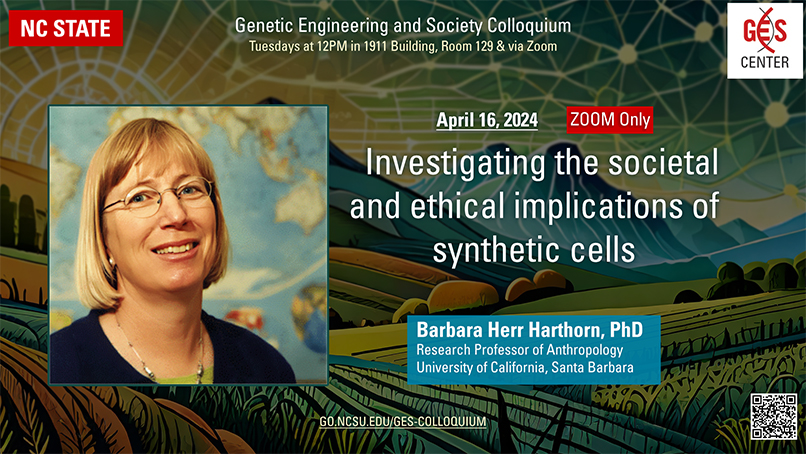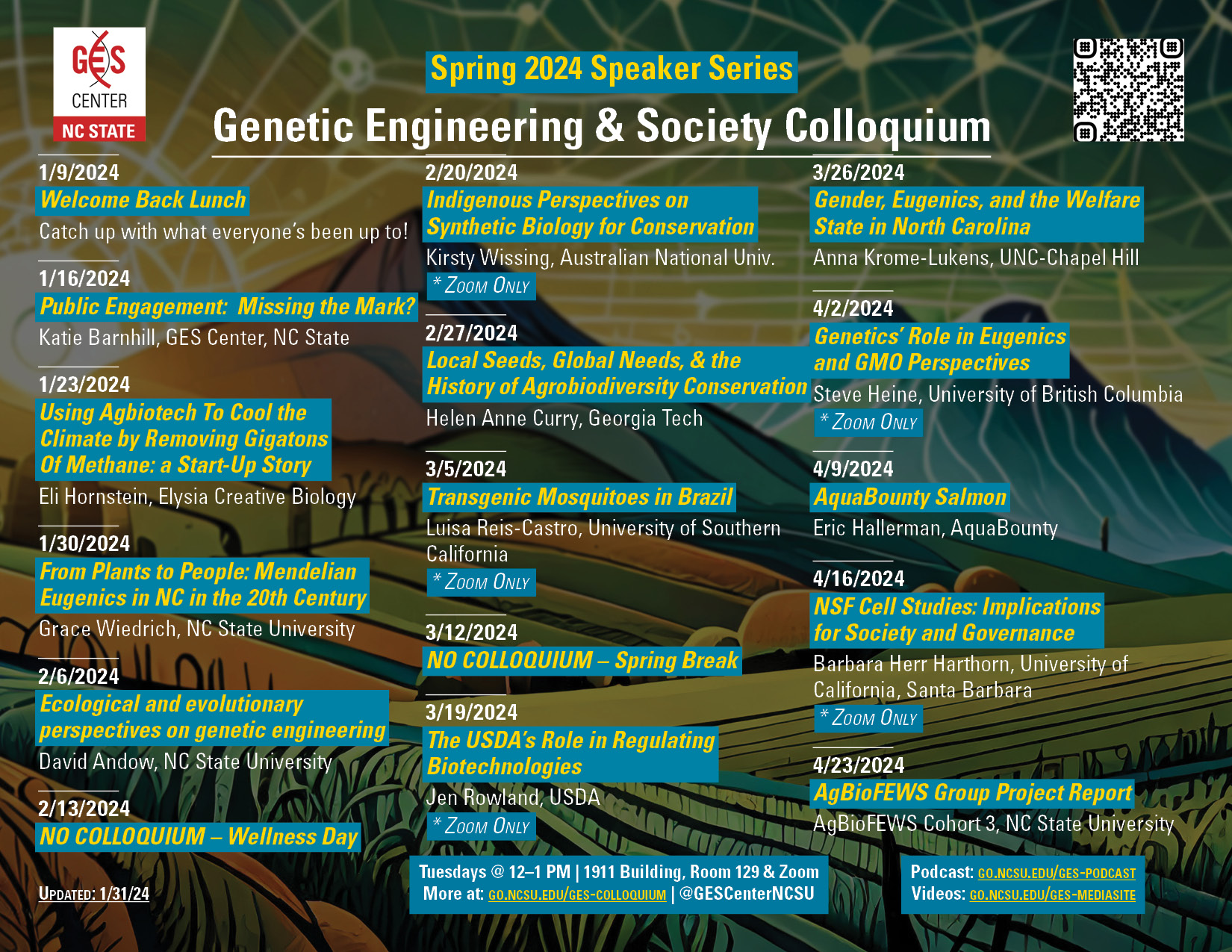
- This event has passed.
Barbara Herr Harthorn – Investigating the societal and ethical implications of synthetic cells [Zoom Only] | GES Colloquium

Colloquium Home | Zoom Registration | GES Video Library (current) | Video Archives | Podcast | @GESCenterNCSU | Newsletter
Investigating the societal and ethical implications of synthetic cells 
Barbara Herr Harthorn, PhD, Research Professor of Anthropology, University of California, Santa Barbara
This talk introduces 3 ongoing NSF-funded collaborative interdisciplinary projects investigating US public and expert views on bottom-up synthetic cells using a responsible research and innovation framework.
DOWNLOAD SEMINAR POSTER
Abstract
Based on three collaborative interdisciplinary research projects on bottom synthetic cells in development in the US on which she is PI, this paper presents an overview of findings on diverse publics’ perceptions of the benefits and risks of new syn cells and some of the main drivers of these views. The research uses a mixed qualitative and quantitative methodological toolkit based on semi-structured interviews, a large representative national survey, and public deliberations. Professor Harthorn examines the range and nuances of public views on these in-the-making science and engineering innovations and promises of enchanted futures, evolution-defying bioengineered life, and economic benefits. In spite of enduring techno-optimism, U.S. publics’ concerns center on the role of such technologies in accelerating economic and social inequalities and injustice. The project also explores public perceived boundaries between living/nonliving, perceived characteristics of life, and other factors that differentiate syn cell perceptions from those of other emerging technologies. The implications of these findings for technological governance and participatory democracy will be discussed.
Speaker Bio
Barbara Herr Harthorn is Professor Emerita and Research Professor in the Department of Anthropology at the University of California at Santa Barbara. She is a medical, cultural, and psychological anthropologist whose research for the past 2 decades has focused on risk perception and public deliberation on societal and ethical aspects of new technologies, including nanotechnologies, fracking, and, currently, synthetic biology/synthetic cells. She served as founding Director and PI of the NSF national center, NSEC: Center for Nanotechnology in Society at the University of California at Santa Barbara (CNS-UCSB) from 2005-2017. In the CNS, she led international, interdisciplinary teams using mixed social science research methods to study risk and benefit perception regarding new technologies among experts and lay publics in the US and abroad. Since 2019, she has been conducting research on public and expert perceptions of synthetic biology and bottom-up synthetic cells within a responsible research and innovation framework. Dr. Harthorn’s publications include The Social Life of Nanotechnology (2012, Routledge, with John Mohr) and Risk, Culture & Health Inequality: Shifting Perceptions of Danger and Blame (2003, Greenwood/Praeger, with Laury Oaks) and numerous chapters, reports, and articles in risk analysis, social science, science and technology studies, science policy, environmental science, and nanoscience journals. She has given invited expert testimony on science in society issues to the US Congressional National Nanotechnology Caucus, the President’s Council of Advisors on Science and Technology (PCAST), the NAS, the US National Nanotechnology Initiative, the US Multi-Agency group on Synthetic Biology, and the European Commission, among many others. Her past work included over a decade of research on Latina/o farmworker health and risk perceptions in California. She is an elected Fellow of the American Anthropological Association, the Society for Applied Anthropology, and the AAAS.
GES Colloquium is jointly taught by Drs. Jen Baltzegar and Dawn Rodriguez-Ward, who you may contact with any class-specific questions. Colloquium will be held in person in the 1911 Building, room 129, and live-streamed via Zoom.
Please subscribe to the GES newsletter and LinkedIn for updates.
WordPress database error: [Unknown column 'wp_tec_occurrences.start_date' in 'SELECT']SELECT SQL_CALC_FOUND_ROWS wp_posts.*, CAST( wp_tec_occurrences.start_date AS DATETIME ) AS event_date
FROM wp_posts LEFT JOIN wp_term_relationships ON (wp_posts.ID = wp_term_relationships.object_id) LEFT JOIN wp_postmeta ON ( wp_posts.ID = wp_postmeta.post_id AND wp_postmeta.meta_key = '_EventHideFromUpcoming' ) LEFT JOIN wp_postmeta AS mt1 ON ( wp_posts.ID = mt1.post_id )
WHERE 1=1 AND wp_posts.ID NOT IN (19516) AND (
wp_term_relationships.term_taxonomy_id IN (149,521,802)
OR
wp_term_relationships.term_taxonomy_id IN (45,47)
) AND (
wp_postmeta.post_id IS NULL
AND
( mt1.meta_key = '_EventStartDate' AND CAST(mt1.meta_value AS DATETIME) >= '2026-02-22 04:35:03' )
) AND wp_posts.post_type IN ('post', 'page', 'attachment', 'tribe_venue', 'tribe_events', 'tribe_event_series') AND ((wp_posts.post_status = 'publish'))
GROUP BY wp_tec_occurrences.occurrence_id
ORDER BY event_date ASC, wp_posts.post_date ASC
LIMIT 0, 3
